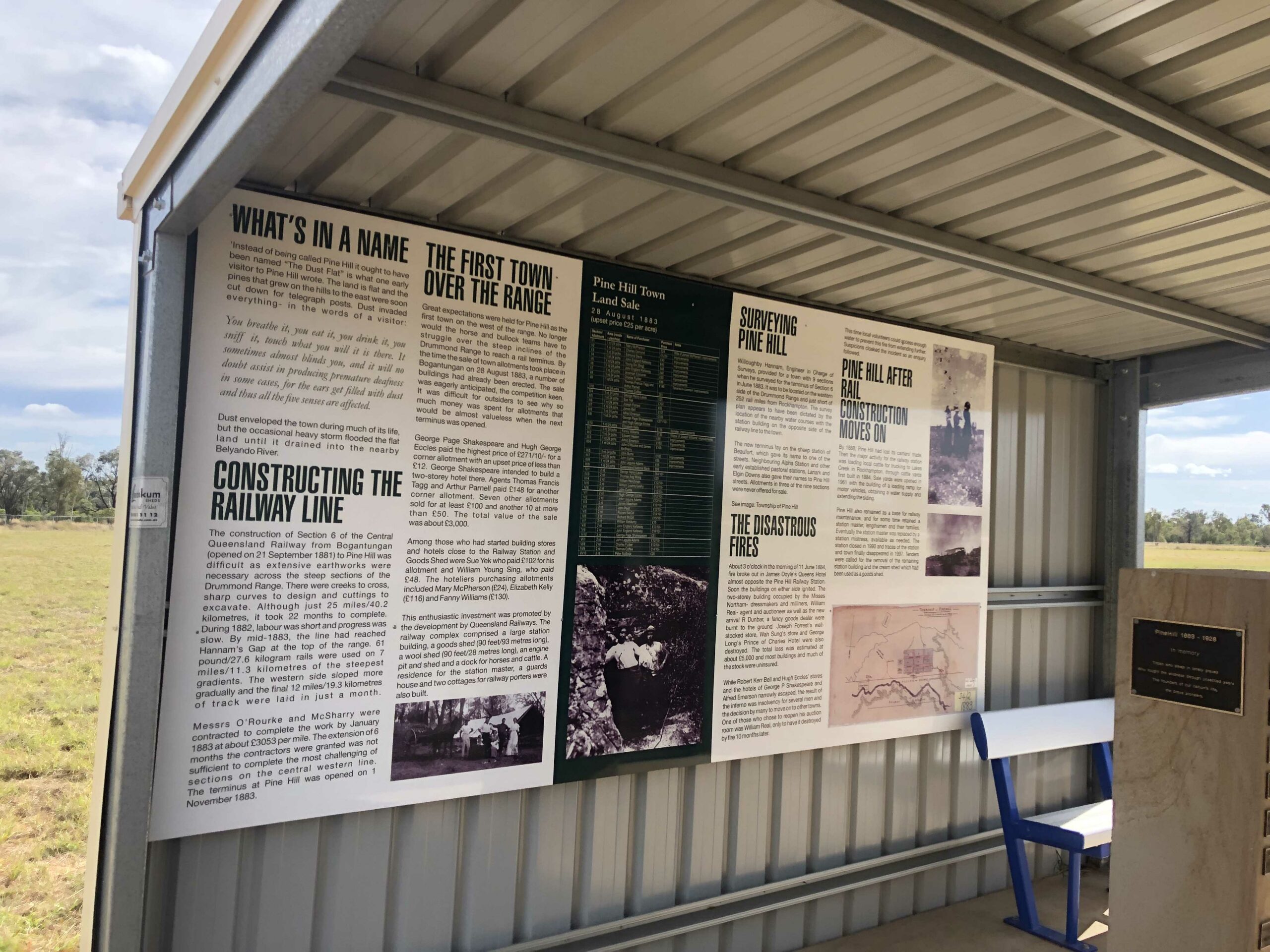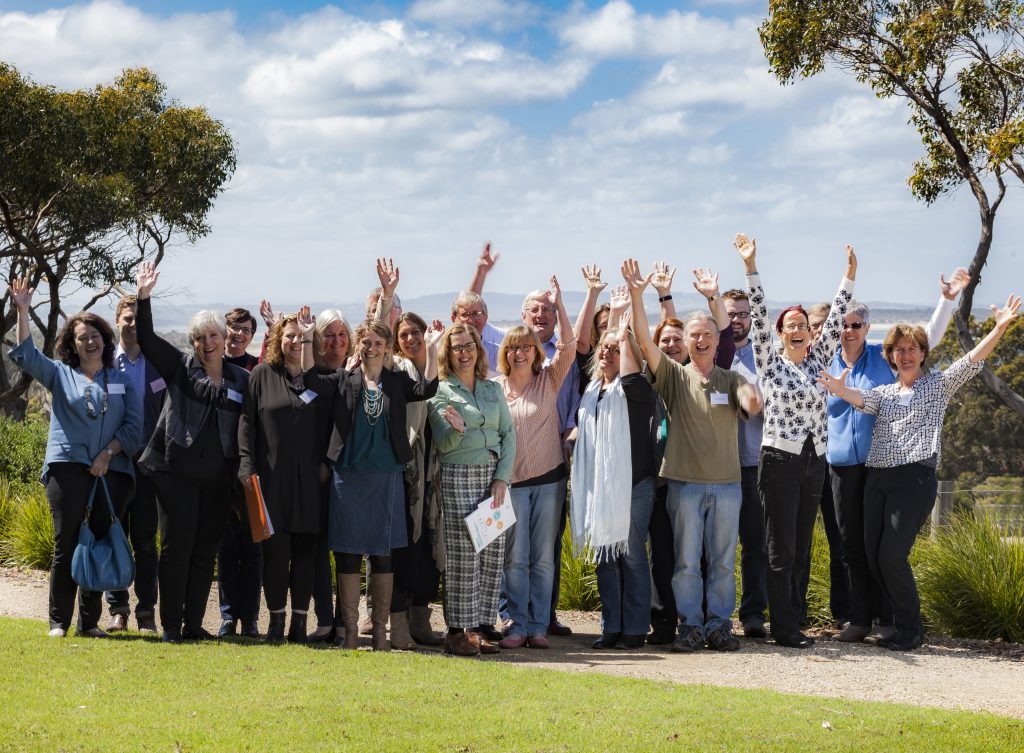Foundation for Rural & Regional Renewal (FRRR)
The IRCF program is designed with roadmapping, community facilitators and capacity building at its core. In the NSW South Coast, the program is culminating in 2024, so the team took the opportunity to codesign four final roadmapping workshops using techniques learned at the Art of Hosting workshop.
A strong learning from the IRCF program around how to connect with busy volunteers who juggle many balls and wear many hats, is the art of invitation. For these workshops our invitation was ‘Lets celebrate our collective effort & explore how to continue the momentum in our community’.

These workshops embraced the opportunity for the groups to review the roadmaps, explore what else may be done, and of course to network. We took a supportive approach to enable the groups to delve into collaborative projects that will benefit the entire community – which will be the focus of the remaining funds generously provided by the Snow Foundation and Bendigo Bank Community Enterprise foundation in the communities.
Attendance at the workshops was strong, with FRRRhosting 55 people. When everyone had gathered, we opened with a check in question at each location: “Can you tell us about a benefit you have personally felt or gained from the IRCF program?”
The sharing that came from this considered question was much richer than any survey could have gathered. Carolyn Ardler, South Coast Program Manager for IRCF, said, “Using Art of Hosting techniques to delve into deeper conversations has been such a strength of the program.”
The groups shared that they now felt more connected to and aware of the NFP community. They have formed stronger relationships within this community and they can now see who is doing what and who has similar needs and common struggles. Not only that but they had formed friendships. The sharing of the skills they had gained was outstanding, with some sharing their growth following opportunities such as the Art of Hosting Conversations that Matter, Regenerate residential program and the Changemakers program, all of which focussed on leadership skill building and connection.
Other learnings were the wide range of capacity building workshops and opportunities throughout the four years. The joy of getting to know people and learn so much from one another without following a cookie cutter approach was one of the biggest benefits of the place based program.
On more than one occasion, people shared that this was the “first time they had popped their head up to see what else was happening.” One Rotarian who has been involved since the beginning of the program said that, “It gave Rotary an opportunity to look at our organisation differently, as well as the opportunity to work with and support other organisations.” A lovely comment was made by a volunteer that it provided “camaraderie – that we all are striving to improve our society.”
The IRCF roadmaps all identified that the NFP sector has a desire to connect with cultural services and better understand the competency journey that comes when connecting more deeply to local first nations culture and people. A participant shared that she has now “a deeper appreciation of indigenous culture.”
The exploration of where we can build on this momentum was different in each community with some groups emerging focused on how community can collectively address important national issues such as homelessness, regional transport and deeper first nations connections, whilst other groups are building alliances across the sector to advocate for funding. The emergence of backbone organisations that support the sector is a strong theme, with one organisation already embedded deeply after four years and wanting to establish more processes and networks to support the volunteers in community.
The workshops were a wonderful opportunity to celebrate the ripple effects that the program has had and to enable us to capture the importance of networking. It provided a space for openness and generosity of the people in the room to shine – creating the opportunity to renew connection and trust in the communities.
More flexible support needed to ensure sustainable, vibrant and empowered communities
FRRR is calling for individuals and organisations to help meet the unmet needs of remote, rural and regional communities, which continue to grow despite FRRR distributing a record $22.5 million in grants in 2023 financial year (FY23).

In FY23, FRRR’s flagship program, Strengthening Rural Communities, awarded more than $3.7 million via 466 small grants, valued at $10,000 or less, that directly benefited remote, rural and regional communities across Australia. The total value of those projects was more than $15.1 million, showing a remarkable leverage of a relatively small investment.
But this is only half the story. In FY23, for nearly every 10 projects that received a small grant, one missed out. In the last round of this program alone, there were 85 funding-ready projects that FRRR couldn’t support because it didn’t have enough money.
Natalie Egleton, FRRR’s CEO, says that FRRR’s small grants empower people in remote, rural and regional Australia to create communities that are vibrant and sustainable places to live and work, for the long-term.
“Rural people want to see their communities thrive. They want to be able to support those doing it tough or with special needs, like older residents; enhance community facilities to respond to the changing climate; provide access to music and cultural experiences for younger people; host events that bring a remote community together to celebrate what makes it unique or to recover after difficult times, just to name a few.
“But every small grants round we offer is oversubscribed, meaning with few alternative funding options, many community projects are left unfunded and critical needs are left unmet.
“It’s not just the dollars that are missed. Groups also say that FRRR’s funding has helped them to build capacity and confidence in their ability to test, learn and develop future other project ideas.
“Small grants help to bridge these gaps and make a lasting difference to remote, rural and regional Australia. By donating to FRRR, you help remote, rural and regional groups – many of whom can’t access funding elsewhere – to create vibrant, sustainable and empowered communities for the long-term,” Ms Egleton explains.
For example, previous small grant recipient, Alpha District Tourism & Development Association, in Queensland, explains, “FRRR has allowed us to achieve something that would have taken us years of fundraising for. Being a very small town fundraising is difficult due to the number of other small clubs and the small population. FRRR Grants are vital to help small communities.”
In Donald, Victoria, the St Arnaud Neighbourhood House used a small grant to improve social participation and the health and wellbeing of aged care residents, by getting local volunteers to record the resident’s life stories. Beyond the monetary value of the grant, the impact of this project was felt deeply throughout the community.
As the organisation shared with FRRR, “We believe this project created a community with a stronger social fabric, where young people were able to gain insights into the lives of those who came before them, and where the residents felt appreciated and respected, and that their life story was being honoured. We were most proud of the effect this project had upon the residents, many of whom were feeling isolated and forgotten. By demonstrating to them that they and their history still had meaning and importance, they felt a connection to the community and to the young people involved in the project.”
Meanwhile, in Morawa, Western Australia, the local playgroup was able to grow educational enrichment opportunities for 0-5 year olds by creating a shady nature play space. with the support of an FRRR small grant. In their project acquittal, Playgroup WA wrote that, “By completing this project it shows that despite being a small, low socio-economic town we can make life better for ourselves. We deserve nice facilities and can create them with the help of organisations like FRRR.”
It’s not just community groups that attest to the critical role of FRRR small grants. Natalie Devlin, Chief Experience Officer at Charter Hall, explains, “Having worked with FRRR since 2020, we have seen first-hand the difference they can make through their local understanding, and connection to grassroots organisations that often can’t access support otherwise.”
To enable FRRR to award more small grants, donate at: here. Contributions of $2 or more are tax deductible.
Find out more about the impact of small grants at: frrr.org.au/small-grants.
FRRR has today welcomed the extension of DGR-1 status for the country’s Community Foundations, in particular those in regional areas, which was confirmed in Tuesday night’s Budget announcements. This special status means that from 1 July, they can directly receive tax deductible donations from a broader range of donors to support more place-based philanthropy, which FRRR has long-championed.

Place-based approaches are critical, especially given the compounding impacts of back to back disasters and the challenges and opportunities in each community. They allow local people to prioritise resources to deliver outcomes that they know will make the most impact, taking account of the unique circumstances of every place.
For the rural and regional communities that have a local Community Foundation that is a member of Community Foundations Australia, this legislative change will mean that they will soon be able to directly accept tax deductible donations to channel toward their local community needs, as well as give to local community organisations that do not have DGR-1 status.
FRRR CEO, Natalie Egleton, says that this reform paves the way for much-needed additional local giving, and that FRRR will continue to support rural communities across Australia to address local and regional issues.
“FRRR was established in 2000 through a partnership between the Australian Government and philanthropy to facilitate long-term and flexible funding to reach and stay in remote, rural and regional communities. In fact, we were set up to address many of the issues raised in the Pride of Place Inquiry, which recommended this DGR extension. We have long championed the important role of place-based philanthropy and indeed, have channelled more than $135 million to in excess of 12,000 projects to support local projects in remote, rural and regional Australia.
“Of this, more than $22 million has gone to support Community Foundations, with some $6 million via the 22 Community Foundations that we have partnered with through a Community Foundation Account. We are proud to have been able to help these Foundations raise and distribute those funds, and to have played a key role in the establishment, development, and promotion of the sector as a whole. We welcome this legislative reform, which will enable even more funding to be channelled locally,” Ms Egleton said.
Over the coming months, FRRR will work closely with the 19 Community Foundations that currently hold Community Foundation Fundraising Accounts and are in a position to take advantage of this legislative reform.
“FRRR will continue to back regional Community Foundations and to facilitate funding and collaborations for other remote, rural, and regional not-for-profits and community groups to advance resilient, vibrant, sustainable regional communities. Our role in connecting resources and supporting the capacity of local leaders and not-for-profit organisations, and having a long-term focus in our work, will remain a key pillar of FRRR’s work.”
Community Foundations Australia commented that “FRRR has been the engine room for the development of Community Foundations in regional Australia, where four out of five of these Foundations operate. This reform may change how we work with each other, but it does not change our shared ambition of working together to support regional community development. Our sector as a whole very much looks forward to building on our well established relationship with FRRR for mutual benefit.”
For more information on the services that FRRR offers, visit www.frrr.org.au.

